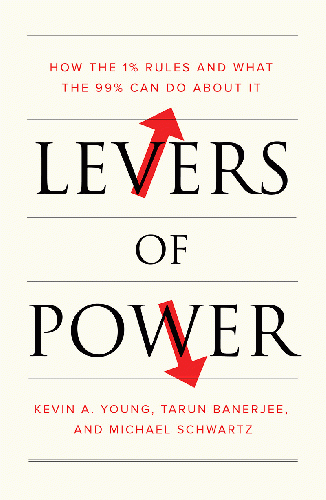Who needs conspiracies, when reality is so much worse? They're comforting, I suppose. But we need people to start participating in public life, with awareness of what's actually at stake. That isn't going to happen by yelling at them about Bill Gates, whatever you want to yell at them about Bill Gates. This book is a very good place to start understanding the "balance of forces", the term the authors use in preference to "balance of power". This is the kind of illuminating nuance you find in this fascinating analysis of our current state of affairs -- or I should say, the context within which the national drama is playing out.
As state and local government "open up", what is driving this premature action, given the scarcity of testing and the storm of disinformation and distraction from the so-called leadership? There are real, ordinary, everyday reasons why "our" governments tell us they're on our side, and then turn around and do the bidding of Wall Street. And it is deeper than just campaign finance, although that plays a big part.
After reading "Levers of Power", it seems clear that the same Wall Street tactics that have blocked any response whatsoever to global warming, and have been eroding or exploding every agency and policy protecting public health and safety since the end of WWII, are in full swing, as usual. And they have levers and fulcrums to work their will. But none of it is happening in some pyramid by torchlight to the ominous hum of chanting fanatics. It's all right out in broad daylight, in the public record, in plain English.
This tome comes well-fortified against the the now-pervasive mistrust of facts. It answers questions. It answers questions raised by questions it also answers. It connects dots, and shows how Wall Street continues to corrupt and co-opt the public good. It reveals starkly how the government's primary design function has evolved to become narrowly focused on protection and extension of corporate profits to the exclusion of all else, including our own extinction. It delineates the small but terribly effective array of corporate strategies and tactics in operation throughout the three branches, citing case after case, from the ACA to the EPA, an unbroken track record of keeping control of the hen-house firmly in the paws of the foxes.
The basics: disinvestment, lawsuits, and campaign finance, more or less in that order. Surprisingly, campaign finance doesn't provide the longest lever of power. What really gets the attention of politicians, judges, legislators and policy-wonks alike, is the threat of disinvestment, aka: "Capital Strike". This may be a new concept to many of us. It describes massive, purposeful disinvestment by Wall Street, such as the current hoarding of two or three trillion dollars, mostly off-shore. The latest bailout was an attempt, like the one before it, and the one before that, to cajole business into bringing, not "jobs", but capital back into the system.
In this light the forty-fifth Chief Executive's bizarre antics stand out prominently as the attention-craving distractions they are. For one example, throwing open the coasts to oil prospecting was shocking and even terrifying, depending on one's awareness of the ongoing ecological catastrophe. But it was an empty gesture that, while returning much immediate political advantage at news-cycle level, could not be implemented, given the real threat of disinvestment. The reaction was swift, from tourism, hospitality (45's own business) and fisheries industries
"...who predicted massive disruption to their business if the proposal were enacted. Their concerns were then transmitted through a bipartisan coalition of governors from coastal states, including far-right Trump allies like Rick Scott of Florida and Chris Christie of New Jersey, who sought exemptions from the Department of the Interior and vowed to take legal action if the administration did not grant them. California officials promised to use their power over licenses to block needed pipelines. Less visible resistance came from the Pentagon, which had opposed a more modest proposal under Obama, arguing that increased drilling would disrupt coastal military exercises.102 This multidimensional opposition appears to have influenced a federal judge's March 2019 ruling against the proposal, as well as the administration's decision to respect the ruling while it appealed.103 The conflict highlights the limits of Trump's freedom to advance particularistic elite interests. He could eliminate safety regulations for existing offshore drilling in the Gulf of Mexico, but he was unable to take actions on behalf of oil companies that would harm other corporate sectors and potentially constrain the military.104"
(Those little numbers at the ends of sentences? They refer to sources. This is not opinion, it's the result of actual research. Something you won't see a lot in your average scary conspiracy story. If you follow these citations, you can usually tell whether the authors are just tooting their own horn, or have something substantial to convey. They are not generally YouTube videos or websites. They are mostly other scholarly works, also well-researched and verified and fact-checked.)
The authors also show how public disruption can determine historic outcomes, as with labor strikes in the 1930s that gave us the decades of relative prosperity we now recall so nostalgically; the long, slow, courageous work of the Civil Rights movement; and the social upheavals that ended the Vietnam War.
This book doesn't spare previous administrations, either; on the contrary. Roosevelt did not bring the New Deal with him into the White House, he was "pulled around" by the action of the supposedly powerless. It rakes Obama over the coals with hard numbers. It shows beyond any doubt how the current occupant is a quite normal Chief Executive, upholding (and striving to increase) the same murderous traditions of foreign policy and anti-immigrant, racist domestic policy, all the while kowtowing, like every President, to the corporate class that calls the shots.
"Elite institutions' capacity to implement or obstruct the president's policies also determined how much Trump could do. For example, the administration was very successful at terrorizing, imprisoning, deporting, sexually assaulting, and sometimes killing immigrants. One prerequisite for that success was lack of resistance from relevant business sectors (such as agribusiness) and the support of relevant law enforcement agencies like ICE and the Border Patrol.105 The other prerequisite was institutional capacity. As immigrant rights advocates have often noted, Trump's predecessors, both Republicans and Democrats, handed him a massive detention and deportation apparatus that he could deploy."
It's the real story of the conflict itself -- not between flamboyant personalities or entrenched ideologies (although many familiar names are named), but a structural one between established institutions of power. It's the financial world versus public health and safety, peace and prosperity. And it's a glimpse into the shifting balance of forces between those at the top of the heap, and everyone else. The stakes are, as always, class survival. To most people, aka "the 99%", survival means food, water and shelter. To "the 1%", it means continued assurance of the unassailable privilege of ownership, and of limitless profit. That's what really determines government policy -- not the "Illuminati", but this abusive structural relationship. And it is quite Shakespearean enough without any added plot-twists.
Whenever the Wall Street Journal, or the head of the Fed, or just about anybody in the whole network talks about "Confidence", you know (especially after reading the book) that there is a negotiation going on, and it's painfully simple. They're talking about Investor Confidence. In our capitalist culture, investor confidence in turning a profit drives the economy, so it is what people's lives depend on. Wall Street has the whole economy as a bargaining chip. What's happening now, at the height of the global pandemic, is a massive, unprecedented capital strike. Wall Street has taken all the marbles -- the bailout intended, so we were told, to start the economy back up -- and gone home. What is it doing with all that moola? Sitting on it. We, the people, are effectively under siege. Our livelihood is at stake, until the corporations get their way. If they don't get "confidence" -- whatever way they define it -- we don't eat.
There is no other reason for this sociopathic behavior but to extort yet more favors from government, in the form of deregulation and lax regulatory enforcement and always, always, tax breaks and subsidies and exemptions. It works every time, as this book shows in case after case, generation after generation.
That's my review of "Levers of Power". It's a great book, buy it and read it, because it doesn't just describe the mechanics: it provides leverage.
(Note: You can view every article as one long page if you sign up as an Advocate Member, or higher).






